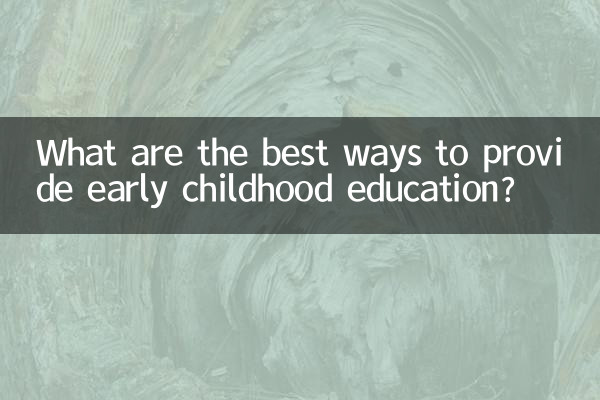What are the best ways to provide early childhood education?
As society attaches increasing importance to early education, more and more parents are beginning to pay attention to how to carry out early education scientifically. Early childhood education is not only about the intellectual development of children, but also involves the cultivation of emotional, social and motor skills. This article will summarize some effective early education methods for you based on the hot topics and content on the Internet in the past 10 days, and provide structured data for reference.
1. The core goals of early childhood education

The purpose of early childhood education is to promote the all-round development of children through scientific methods during their golden development period (0-6 years old). The following are several core goals of early childhood education:
| target | Specific content |
|---|---|
| intellectual development | Stimulate children's cognitive abilities through games, reading, etc. |
| emotional cultivation | Help children build a sense of security and emotional management skills |
| social skills | Cultivate children's cooperation and communication skills through interactive games |
| athletic development | Promote the development of gross and fine motor movements through physical activities |
2. Recommendations for popular early childhood education methods
Based on recent hot discussions, here are several highly recommended early childhood education methods:
| method | Applicable age | Specific operations |
|---|---|---|
| Parent-child reading together | 0-6 years old | Read picture books with your children at a fixed time every day to develop language skills and concentration. |
| Music enlightenment | 0-3 years old | Play soothing music or children's songs and guide your children to clap or dance to the rhythm |
| sensory play | 1-4 years old | Use sand, water, building blocks and other materials to stimulate children's touch and vision |
| Outdoor exploration | 2-6 years old | Bring children into contact with nature, observe animals and plants, and stimulate curiosity |
3. Common misunderstandings in early childhood education
Although the importance of early education is widely recognized, many parents tend to fall into the following misunderstandings in practice:
| Misunderstanding | Correct approach |
|---|---|
| Learning knowledge too early | Game and experience should be the main focus and avoid instilling academic content prematurely |
| ignore emotional needs | Spend more time with your children and respond to their emotional needs in a timely manner |
| Over-reliance on electronic products | Limit screen time and prioritize physical interaction |
4. How to choose an early childhood education institution
If parents choose to send their children to early education institutions, they can refer to the following standards:
| Assessment Dimensions | Specific content |
|---|---|
| Faculty | Do teachers have professional qualifications and affinity? |
| Course design | Does the course focus on overall development rather than single skills? |
| environmental safety | Are the facilities safe, hygienic, and have sufficient space? |
5. The role of parents in early childhood education
Parents are their children's first and most important teachers. The following are some points that parents should pay attention to in early childhood education:
1.Lead by example: Children have extremely strong imitation abilities, and parents’ behavior will directly affect their children.
2.Patient guidance: Avoid impatience and respect your child’s learning pace.
3.Encourage exploration: Provide a safe environment for children and allow them to experiment freely.
Conclusion
Early education is a science and an art. Through scientific methods and warm companionship, parents can help their children lay a solid foundation in their early stages of growth. I hope the methods and data provided in this article can inspire you to help your children thrive in happiness.

check the details

check the details